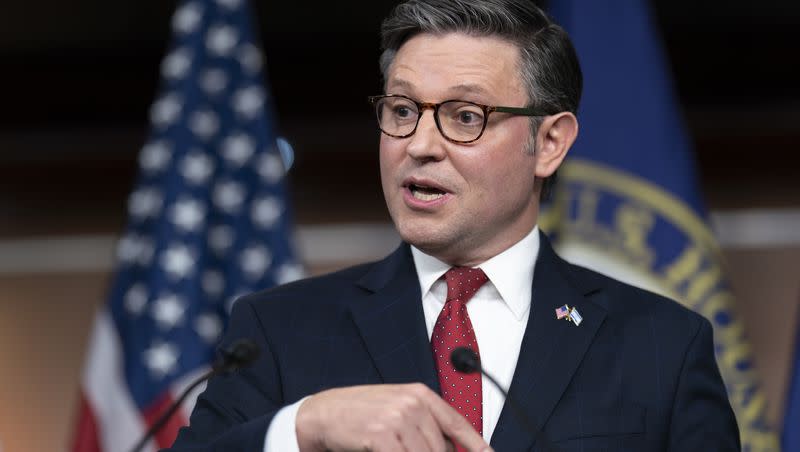House moves to avoid shutdown, putting Speaker Johnson in precarious position

- Oops!Something went wrong.Please try again later.
The House passed a resolution Tuesday that would keep the government open at least until January. Senate Majority Leader Chuck Schumer, a Democrat, has said he would bring the measure up for a vote.
Republican House Speaker Mike Johnson, who championed the legislation, overcame his party’s most uncompromising members to help pass the bill and avoid a government shutdown — in a move that got his predecessor fired less than two months ago.
A majority of the House Republican Conference, including Utah’s three congressmen — Reps. Blake Moore, John Curtis and Burgess Owens — voted in favor of the measure that would extend government funding at current levels into early next year, providing time to work through the annual spending bills individually and with the Senate and removing the threat of disrupting lawmakers’ holiday plans.
“It is disappointing that the House has failed to do its job by passing spending bills on time that reflect Utah’s fiscal conservative values,” Curtis said in a statement after the vote.
“That said, Speaker Johnson has only been on the job three weeks,” he said. “I support this continuing resolution for the next few months to give our new Speaker the opportunity to unite the conference around a plan to rein in our out of control spending while responsibly keeping the government open.”
The 127 House Republicans who voted in favor of the short-term spending bill were joined by 209 of their Democratic colleagues, easily clearing the required threshold for the bill to pass, which was raised to two-thirds of the legislative body after the measure wasn’t supported by the Republican-led rules committee.
The “clean” continuing resolution doesn’t include any spending cuts — a feature that attracted the support of Democratic leadership, making the bill’s passage possible, but that alienated members of the conservative House Freedom Caucus, and others, who came out against Johnson’s proposal despite it being based on their timing recommendations.
“Republicans must stop negotiating against ourselves over fears of what the Senate may do with the promise ‘roll over today and we’ll fight tomorrow,’” the Freedom Caucus said in a statement Tuesday.
Related
At 93, the number of Republicans to oppose the continuing resolution was slightly more than the 90 GOP lawmakers who rejected former House Speaker Kevin McCarthy’s last-ditch proposal on Sept. 30.
As with Tuesday’s vote, McCarthy’s effort to stave off a shutdown of “nonessential” government services on Oct. 1 garnered more Democratic support than Republican — one of the many factors cited by a small group of Republican representatives who caused McCarthy’s removal from leadership just four days later.
The parallel between the situation that led to McCarthy’s downfall and the one Johnson currently finds himself in has not been lost on Republican lawmakers.
“For the same reasons that I opposed the (continuing resolution) on (Sept. 30), I oppose the (continuing resolution) that speaker Johnson is putting forward,” said Rep. Chip Roy, R-Texas, a member of the Freedom Caucus, on Monday. “That’s precisely what was put down on Saturday, (Sept. 30), that then resulted in the motion to vacate against Kevin (McCarthy) that following Tuesday. And here we are doing the same thing.”
While members of the House Freedom Caucus, including those behind McCarthy’s ouster, initially signaled they were open to giving Johnson more leeway on spending than they did with McCarthy, they also expressed confidence the new speaker would secure conservative wins from a shutdown battle.
“He’s not going to cave,” Freedom Caucus chair Scott Perry, R-Pa., said last week of Johnson, according to Punchbowl News.
“The outcome is going to be quite a bit different,” said Rep. Eli Crane, R-Ariz., who was one of the eight GOP lawmakers to vote to remove McCarthy, Punchbowl News reported. “Speaker Johnson is a lot more conservative and I don’t believe he’s as transactional.”
In the end, Johnson did go along with the novel “two-step” continuing resolution proposed by Freedom Caucus members, extending funding for four of the 12 annual spending bills until Jan. 19, and the remaining eight until Feb. 2, to facilitate their passage through “regular order,” where each bill is considered and voted on individually.
However, Johnson did not include other Freedom Caucus priorities, like spending cuts or border security provisions, because doing so would have made the House’s proposal a nonstarter in Congress’ upper chamber, allowing the Democrat-led Senate to “jam” House Republicans with a last minute funding fix, Rep. Mike Simpson, R-Idaho, a top House appropriator, told the Deseret News last week.
Related
With government shutdown in sight, senior lawmaker tells House Republicans: ‘Don’t get cute’
Will the prolonged speaker’s race fix ‘out of control spending’? Or make it worse?
“While I firmly believe Congress should be focused on passing all appropriations bills one at a time and on time, the House must prioritize the needs of the American people and keep our government open,” Simpson said in statement Tuesday. “Government shutdowns are never the way to govern, and a shutdown would prevent Congress from getting back to regular order.”
Johnson’s continuing resolution will now advance to the Senate where top leadership on both sides of the aisle have expressed support for the House proposal, according to Punchbowl’s Andrew Desiderio.

